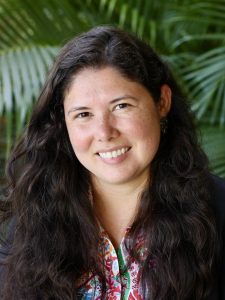CREiGS accepts SONDH Faculty Member for Competitive Program
Assistant Professor Samia Valeria Ozorio Dutra has been accepted in the competitive Clinical Research Education in Genome Science (CREiGS) short-course program, which commences this fall in New York City. The course suits Dutra’s work as a researcher specializing in the gut-brain axis and mental health promotion.

“I study the gut microbiome-brain axis focusing on mental health promotion and neurodevelopment,” Dutra says. “In my career trajectory, I have been exploring biomarkers and mental health. My current research involves learning to use machine learning to improve risk detection of depression among Native Hawaiians/Pacific Islanders (NHPI) using a nationwide dataset in the Artificial Intelligence/Machine Learning Consortium to Advance Health Equity and Researcher Diversity (AIM-AHEAD) (1OT2OD032581-01, NIH funded). Because this project does not include genomics data, my next step would be to integrate clinical data with genetics and genomics analysis.”
Through the CREiGS course, Dutra will participate in intensive, hands-on instruction covering topics such as Introduction to Genetics and Genomics, Quantitative Methods for Analysis of Genetics and Genomics Data, Computational Tools and Data Management, Engaging Diverse Communities in Genetics and Genomics Research.
“The skills offered by the Clinical Research Education in Genome Science (CREiGS) Short Course, particularly its focus on improving cross-over knowledge and skills between basic laboratory research and clinical and translational research, are exactly what I need to support the development of an independent research career,” Dutra says. “Integrating clinical data with genetics and genomics data advances my bioinformatics skills, allowing me to become methodologically proficient in genome science for clinical research.”
The course offers a complement to Dutra’s current work.
“The program also aligns with my experience in the Leading Emerging and Diverse Scientists to Success (LEADS) Program (sponsored by R25 GM116740, NIH), focused on translational research. This is crucial for nurses because it bridges the gap between scientific-discovery and real-world community care,” Dutra says. “The CREiGS Short Course will provide access to valuable training and networking to advance the science and my own independent research program focused on the development of future precision health initiatives that support healthcare services in promoting society’s overall health, particularly for Native Hawaiians/Pacific Islanders.”
This research was, in part, funded by the National Institutes of Health (NIH) Agreement NO. 1OT2OD032581-01. The views and conclusions contained in this document are those of the authors and should not be interpreted as representing the official policies, either expressed or implied, of the NIH.
